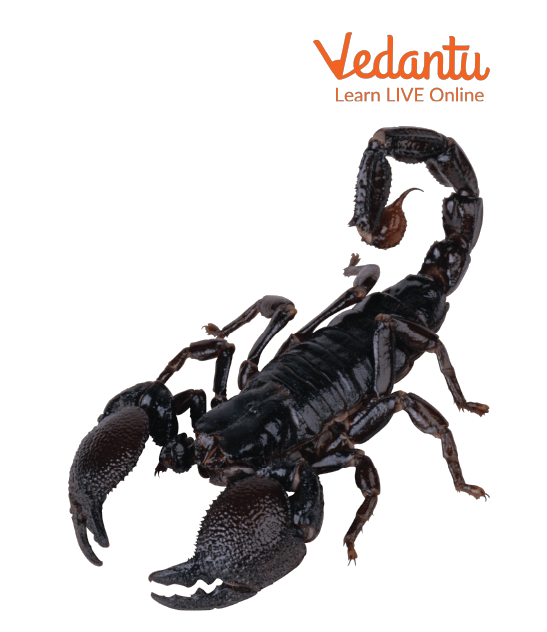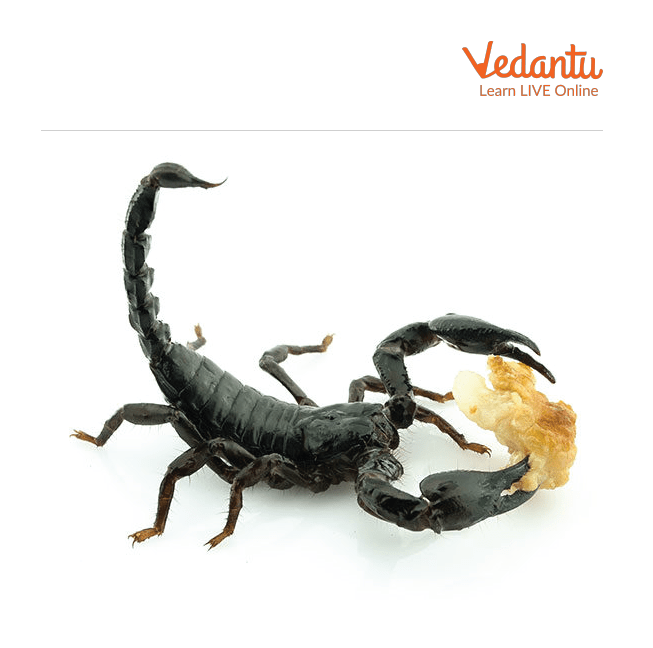




Why Do Black Scorpions Matter in Environmental Studies?
Scorpions are predators animals which are generally considered insects, but they are not. As a matter of fact, insects are one of their major staple diets. They have been on earth for millions of years. There are as many as 1700 living species of scorpion and out of them, only 1.47% of them are poisonous. They play a major role in the food chain cycle by eating insects.

Black Scorpion Animal
Size And Diversity
The black scorpion (Heterometrus longimanus, of the family Scorpionidae), or the Asian forest scorpion, is a resident of tropical Asian regions. Black scorpions typically live under logs and other natural debris. Black scorpions are large in comparison to other scorpions (generally considered as giant). Black emperor scorpion, an African species found in guinea has a body length of about 18 cm and a mass of 60 grams.

Black Scorpion
Food They Eat
Scorpions generally eat insects and some rodents. They are opportunistic predators that eat any small animal they can capture and kill which include spiders ,bugs and even sometimes other scorpions. Talking about black scorpions,in their natural conditions insects like cricket or worms are present. So they consume them without a growth accelerator.

Scorpion Eats Insect
Habitat
They can be observed in many types of habitats, but deserts and semi-arid regions are the most common ones. Most scorpions hide in holes or under logs to protect themselves from predators. There is a scorpion called bark scorpion, which rests on vertical surfaces like trees, bushes and walls. Black scorpions are mostly found in South Africa, East Asia, Southern Europe and Australia.
Smuggling of Black Scorpions
Black scorpions have high demand on the market for various purposes and for that they are smuggled a lot. They can cost on average hundreds of dollars. In words of a local Herat dealer, a 60 gram black scorpion was sold at a price of $120,000. They are in high demand in various sectors but mostly used for medical research.Its venom is used to develop compounds for anti cancer medicines.
In some countries like China, they are popular street-food snacks. Since they are found in asian regions, they are highly smuggled in countries like Afghanistan, Pakistan, etc. Due to this many species have gone extinct and some are on the verge of extinction. Their venom is also in high demand in the USA and Europe.
According to a report published in the Wall Street Journal - their venom is sold for $39 million a gallon.
Interesting Facts About Black Scorpions
Scorpions were around long before the first dinosaurs.
They dance before mating.
They give birth to live young.
Some baby scorpions stay with their mother for 2 years.
They glow in UV light.
Some scorpions can go a year without food.
Their venom can include dozens of different toxins.
They’re stingy with their stingers.
Their venom can kill or save lives.
Black scorpions are non poisonous. Their venom is so weak that it can’t even kill its prey.
Solved Questions
1. Which scorpions are most poisonous?
Ans. Deathstalker is the most poisonous scorpion.
2. Which country has the most scorpions?
Ans. Mexico has the most scorpions in the world.
3. What is the size of black scorpion?
Ans. Average size of black scorpions is about 10 cm.
Conclusion
Scorpions may be dangerous animals but actually they are quite interesting, which will not harm you until and unless you mess with them. They play a vital role in the proper functioning of the food chain. They are often called the friends of farmers as they eat the insects which harm their crops. We should respect and avoid animal exploitation as our survival is also dependent on them directly or indirectly.
FAQs on Key Facts About Black Scorpions
1. What exactly are Black Scorpions and where are they typically found?
The Black Scorpion, scientifically known as Heterometrus longimanus, is also called the Asian Forest Scorpion. They are not insects but arachnids, just like spiders. They primarily live in the tropical and subtropical regions of Asia, commonly found hiding under logs, rocks, and other debris on the forest floor, where the environment is humid.
2. What kind of food do Black Scorpions eat in their natural habitat?
Black Scorpions are opportunistic predators that play an important role in their ecosystem. Their diet mainly consists of:
- Insects like crickets and worms
- Spiders and other small arachnids
- Occasionally, other small animals they can overpower
3. Is the sting from a Black Scorpion (Asian Forest Scorpion) dangerous to humans?
No, the sting from a Black Scorpion is not considered medically significant or dangerous to humans. Their venom is very mild and primarily used to subdue small prey. For a person, a sting would typically result in localised pain, swelling, and redness, similar to a bee or wasp sting. Severe allergic reactions are very rare.
4. If their venom isn't very poisonous, why is Black Scorpion venom so expensive and in high demand?
The high value of scorpion venom lies in its complex chemical composition, not its toxicity to humans. Even mild venom contains dozens of unique compounds, such as peptides and proteins. Researchers are studying these compounds for their potential use in medical applications, including the development of new drugs for conditions like cancer and heart disease. This research potential drives its high market value.
5. How does the Indian Black Scorpion differ from the Asian Forest Scorpion?
While both are often called 'black scorpions', they are different species. The Indian Black Scorpion (often Heterometrus swammerdami) is one of the largest scorpion species in the world. The main differences are:
- Size: The Indian Black Scorpion is generally larger than the Asian Forest Scorpion.
- Geography: As their names suggest, one is found predominantly across tropical Asia, while the other is native to India and Sri Lanka.
- Venom: Both have venom that is not considered life-threatening to humans, causing only mild, localised symptoms.
6. What is the ecological importance of Black Scorpions in their environment?
Black Scorpions play a vital role in maintaining the balance of their ecosystem. As natural predators, they help control populations of insects and other small invertebrates. This is particularly beneficial in agricultural areas, where they can help reduce pests that damage crops, earning them the nickname 'friends of farmers'. They are also a food source for larger animals, making them a key part of the food web.
7. What are the recommended first-aid steps if someone is stung by a Black Scorpion?
If stung by a Black Scorpion, the most important thing is to stay calm, as the venom is not dangerous. The recommended first-aid steps are:
- Clean the affected area gently with mild soap and water to prevent infection.
- Apply a cool compress or ice pack to the site of the sting to help reduce pain and swelling.
- Avoid taking any food or liquids if you experience difficulty swallowing.









